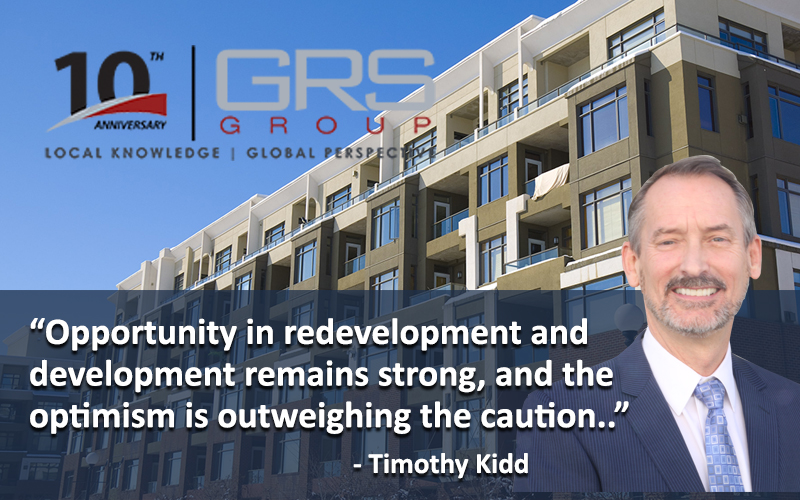Timothy Kidd is a vice president at GRS Group. He can be reached at 323.853.0488 or via email at tkidd@fv2.d32.myftpupload.com
There is a little bit of hesitancy in the commercial real estate market because of heightened talk about a possible economic downturn soon, but investors are still bullish on the multifamily market.
I was recently at the GlobeSt. Apartments conference in Los Angeles, and the well-attended event had an overall mood of cautious optimism shared by both speakers and attendees.
The consensus is that opportunity in redevelopment and development of properties remains strong, and the optimism is outweighing the caution enough that investors see the value in building more apartments.
On a panel titled “Development and Redevelopment: Implementing a Value-Add Strategy,” one of the speakers was Laurie Lustig-Bower, and executive vice president at CBRE’s multi-housing group. Her firm recently reported that vacancy rates in the sector were at 3.6 percent during the third quarter, the tightest figure since 2000. And it’s that low because rental absorption is outpacing new-development deliveries. Though 256,000 new apartments were completed during the 12 months ended at the close of the third quarter, 307,600 units were leased during that time.
That’s because there are some limiting factors that investors face, including rising construction costs, availability of sites to develop and the financial viability of renovating certain current properties.
California is one of the most challenging markets of the entire United States. Its problems include affordability issues, rising regulations, and again, costs.
So what can developers do? Lustig-Bower mentioned modular construction, development near public transit to cut down on parking spaces and trying to stay away from the high expenditures of underground parking structures. And developers are also building smaller individual units.
Meanwhile, Brett Betzler, a partner at Moran & Co., said that some developers are breaking from traditional apartment-complex models, trying out co-living scenarios that have a similar feel and operation system as hotels and other hospitality assets.
Outlining other non-traditional challenges and opportunities in the multifamily sector, there was a look at how current and future technological innovations are shaping apartments. Several CRE tech companies presented at GlobeSt. Apartments, pitching their products to attendees.
ButterflyMX, based in New York City, offers apartment video intercom systems that also work as a digital key, handles packages acceptance and manages security , all through a smart phone. Spain-based SALTO Systems provides smart-lock platforms, which eliminate the need for mechanical keys, while Zerv, based in Chicago, functions similarly.
Though construction costs and tenant expectations are factors that can fluctuate depending on different economic cycles, but the host of innovative new tech solutions available to landlords might be able to help them cut costs and keep up with a younger generation of renters’ expectations.
About GRS Group
GRS Group is a leading provider of commercial real estate (“CRE”) services worldwide. With offices across the United States, Europe, and affiliates around the globe, GRS Group provides local market knowledge with a global perspective for institutional real estate investors, occupiers and lenders worldwide. The GRS Group team has evaluated and advised on over $1 trillion in CRE transactions.
Through the company’s proprietary management process, Global Services Connection, GRS Group delivers an integrated suite of services including Financial Advisory, Transaction Management, Assessment and Title Insurance. We provide a single point of contact, capable of leveraging the GRS Group portfolio of companies and delivering customized solutions to assist our clients in achieving their investment goals.

